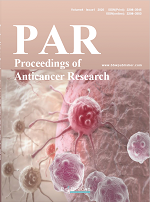Abstract
Background: In patients receiving anti-cancer chemotherapy, polyethylene glycolated recombinant human granulocyte-colony stimulating factor (PEG-rhG-CSF) was used for prophylaxis of chemotherapy-induced neutropenia. However, the side effect of PEG-rhG-CSF use on fasting blood glucose (FBG) level remains unclear. Materials and Methods: Cancer patients receiving chemotherapy and PEG-rhG-CSF were enrolled in our study. Baseline glucose (Glucose 1) was measured before PEG-rhG-CSF use, a second FBG test (Glucose 2) was performed after PEG-rhG-CSF use. Mean glucose levels were compared using t test. Results: The time interval between PEG-rhG-CSF use and the second glucose test was 2.4±1.5 days. The mean Glucose 1 was 5.18±0.53 mmol/L, and Glucose 2 was 3.80±1.13 mmol/L. Statistical analysis showed a significant difference between Glucose 1 and 2 existed (P<0.001). Conclusion: Our study identifies a hypoglycemic side effect of PEG-rhG-CSF occurs in cancer patients undergoing anti-cancer chemotherapy. Our results highlight the caution required when using PEG-rhG-CSF for prophylaxis of chemotherapy-induced neutropenia.
